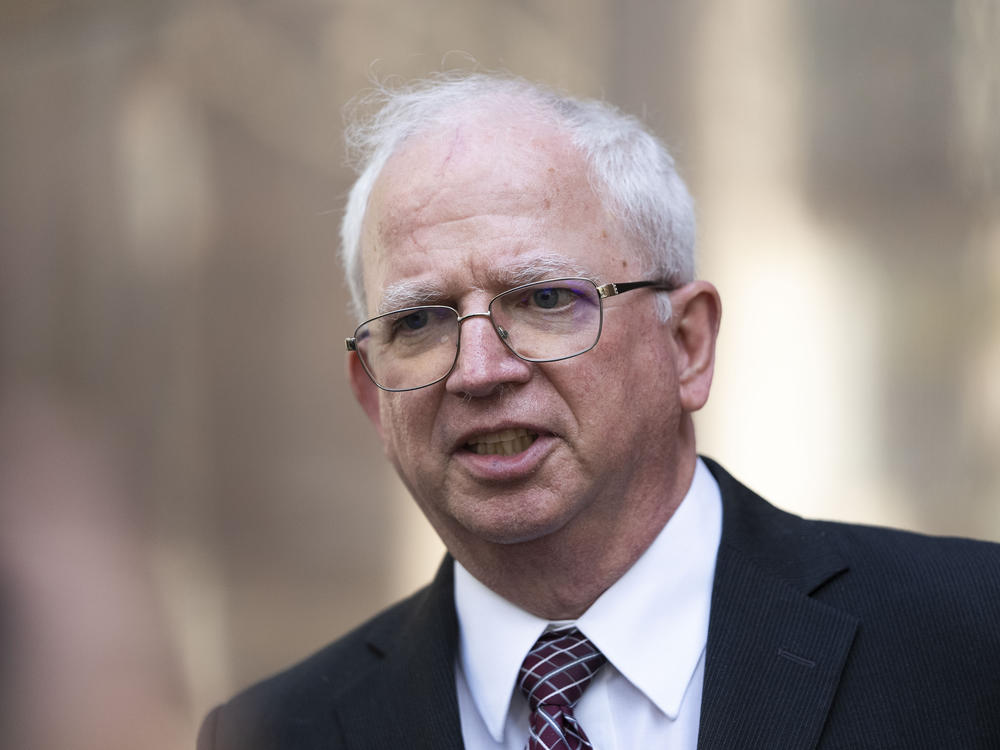Section Branding
Header Content
California judge recommends disbarment of pro-Trump attorney John Eastman
Primary Content
A California judge has formally recommended that attorney John Eastman lose his law license for his role in Donald Trump's legal effort to remain in power after losing the 2020 presidential election.
Eastman, a prominent figure in conservative legal circles and a former clerk for Supreme Court Justice Clarence Thomas, played a key role in developing and backing a plan for states to send pro-Trump slates of electors to Congress and have then-Vice President Mike Pence unilaterally block or delay the certification of Joe Biden's election victory.
"Eastman's wrongdoing constitutes exceptionally serious ethical violations warranting severe professional discipline," wrote California State Bar Court Judge Yvette Roland in her decision. "Eastman made multiple patently false and misleading statements in court filings, in public remarks heard by countless Americans and to others regarding the conduct of the 2020 presidential election and Vice President Pence's authority to refuse to count or delay counting properly certified slates of electoral votes on January 6, 2021."
Judge Roland also criticized Eastman's defiant response to the allegations against him.
"His lack of insight into the wrongfulness of his misconduct is deeply troubling," wrote Judge Roland. "While Eastman is entitled to defend himself, his conduct goes beyond this, revealing a complete failure to understand the wrongfulness of his actions."
In addition to disbarment, Judge Roland recommended that Eastman pay $10,000 in fines.
Judge Roland's recommendation will be reviewed by the California Supreme Court, which will ultimately decide whether he can retain his law license. In the meantime, Judge Roland's decision places Eastman's license on "involuntary inactive" status, which will effectively prohibit Eastman from practicing law.
In response to the decision, attorney Randall Miller, who represented Eastman in the State Bar proceedings, stated that Eastman will appeal. "Dr. Eastman maintains that his handling of the legal issues he was asked to assess after the November 2020 election was based on reliable legal precedent, prior residential elections, research of constitutional text, and extensive scholarly material," Miller wrote in a statement.
In its case against Eastman, the State Bar of California had argued that Eastman "misused his license in a grave and injurious manner designed to undermine our democracy, subvert the peaceful transfer of presidential power, and thwart the will of the people in a free and fair election. In doing so, he betrayed the fundamental duties and oaths he swore to uphold."
Eastman denied all wrongdoing, insisting that he was simply zealously advocating for his client, Trump, and that his legal arguments were reasonable and up for debate. In California State Bar Court, Eastman testified in his own defense and continued to advance claims that the 2020 election was marred by widespread illegality. In recent media appearances, he has also cited widely debunked claims about election fraud, such as the pro-Trump film "2,000 Mules."
In court, the California State Bar rebutted Eastman's claims with evidence and testimony from state election officials. Eastman, for his part, testified that he had not taken steps to independently verify several claims of election fraud that he had advanced in legal proceedings.
One of multiple Trump attorneys under scrutiny
Eastman is one of several attorneys who advanced the Trump campaign's 2020 election efforts and who have since faced disciplinary action from legal authorities, including Rudy Giuliani, Jeffrey Clark, Jenna Ellis and Sidney Powell.
Eastman also faces state criminal charges in Fulton County, Ga., for his role in the Trump campaign's legal effort to overturn the 2020 election. He has pleaded not guilty. Special Counsel Jack Smith has also ordered transcripts of Eastman's testimony in California State Bar Court, suggesting Eastman is under federal scrutiny as well, as first reported by Politico.
Prior to joining the Trump legal team, Eastman served as dean of the Chapman University law school and unsuccessfully campaigned to become California Attorney General in 2010.
After the 2020 election, Eastman joined Trump's legal effort to overturn the election results and advanced claims of fraud that were consistently rejected by courts. Eastman then authored memos describing a plan, under which Pence would block the certification of Biden's electoral college victory in Congress.
On the morning of Jan. 6, 2021, Eastman took the stage along with Rudy Giuliani at the pro-Trump "Stop the Steal" rally at the Ellipse near the White House and claimed that the election had been tainted by "fraud." During his speech to the crowd, Eastman stated - without any evidence - that computers that tabulated vote totals had a "secret folder" that was used to falsify the results, and pressured Pence to act.
Despite the pressure campaign from Trump, Eastman and others, Pence ultimately rejected the plan as unconstitutional.
A mob of Trump supporters attacked the U.S. Capitol, injuring 140 police officers, forcing lawmakers and their staff to evacuate or barricade themselves in hiding places, and delaying the certification of the electoral college vote.
"Thanks to your bull[****], we are now under siege," Greg Jacob, who served as legal counsel for Pence, emailed Eastman as the riot unfolded.
"The 'siege' is because YOU and your boss did not do what was necessary to allow this to be aired in a public way so the American people can see for themselves what happened," Eastman replied.
Despite the attack, Eastman continued to advocate for Pence to block the certification of Biden's victory.
Days later, Eastman sought to shield himself from potential legal fallout connected to the attack on the Capitol.
"I've decided that I should be on the pardon list if that is still in the works," Eastman wrote in an email to Rudy Giuliani on Jan. 11, 2021.
Eastman has described the legal scrutiny from the State Bar of California as politically motivated. "This is authoritarianism, not republicanism," his attorneys wrote in their closing arguments.

